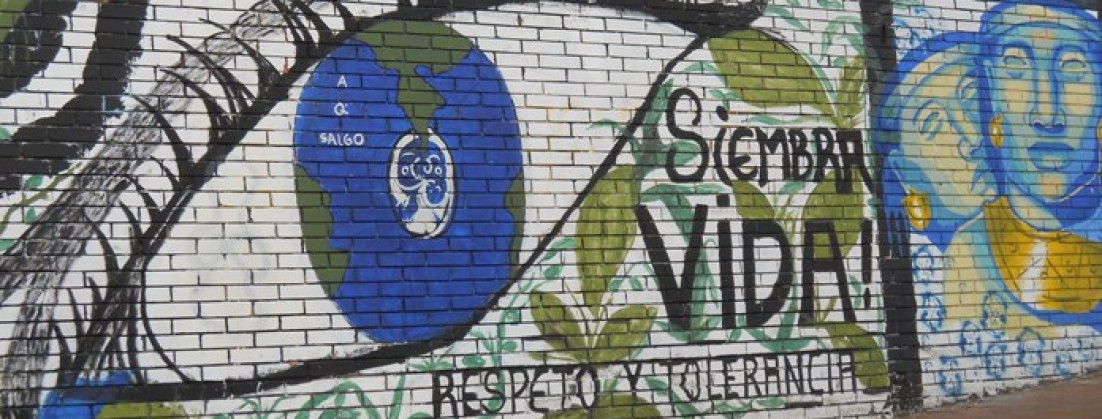Colombia’s population of internally displaced people has now surpassed the Sudan to become the largest in the world. (3.9 to 5.3 million at year end 2011, 65 percent under 25 years old).[1] Displacement, or forced migration, has multiple interacting causes, including multinational trade agreements favoring extractive industries, Colombia’s ongoing violence as part of its armed conflict, political corruption, and woefully inadequate infrastructure and public services.
Since the 1990s, paramilitary “auto-defensa” groups financed by wealthy landowners have forced farmers off fertile land and areas with natural resources like gold, oil, and other minerals. Foreign investment has tripled since 2002, and about 1 in 20 Colombians has been newly displaced since then. However, none of the funds have trickled down to average Colombian citizens, many of whom have historically lived in areas with small agricultural economies. According to a recent piece in The Economist:
Land distribution in Colombia is among the most unequal in the world, with 52% of farms in the hands of just 1.15% of landowners, according to a study by the United Nations Development Programme. The agriculture ministry says that only 22% of potential arable land in a vast country is cultivated. Around 6.5m hectares (16m acres) of land, including some of the most fertile, was stolen, abandoned or forcibly changed hands in other ways between 1985 and 2008 as a result of the conflict.
Additionally, several U.S. companies have been sued under the Alien Tort Statute [2] for aiding and abetting paramilitary groups by making “security” payments. Most recently, a suit has been brought against Chiquita Banana’s wholly owned subsidiary, Banadex, by families in the Urabá region whose loved ones were kidnapped, tortured, and murdered by AUC (Autodefensas Unidas de Colombia). The class action is pending[3]; but other American companies in Colombia have faced faced allegations of “synergistic relationships” with hired “security contractors” (paramilitaries).[4] In this context, security for multinational corporations is but a thinly-veiled justification for the forceful, violent annexation and evacuation of indigenous and campesino families from their agriculturally viable, and valuable, resource-rich land.
Despite collective title vested in Afro-Colombian communities in 1993 through Law 70, and nominal protection of land as resguardos (reserves of legally inalienable land to indigenous communities), land continues to be illegally stolen and sold to foreign agribusiness companies, who use it to produce oil palm and other raw materials for agro-fuel for sale in the international market.[5] The Colombian Constitution has been modified nearly 70 times since 1991, as political elites (closely tied to both private multinational corporations and paramilitary actors) have manipulated the laws to favor growth of lucrative, privatized, extractive industries–using “security” and “protection” to forcibly remove people from their property. These latifundas (landgrabs) have forced migration of indigenous peoples and Afro-Colombians to the outskirts of cities such as Cali, where they face enormous marginalization in makeshift refugee settlements: minimal employment opportunities in agriculture, poor housing not supported or recognized by municipal governments, and outright racial discrimination from citydwellers and police.

Ukawexs, Nasa refugee settlement outside Cali, Colombia. Photo credit: Hillary Watson
On my recent trip to Colombia, we visited one such settlement high in the mountains outside the city of Cali, where more than 500 families have sought refuge from the Cauca region over the past 5-10 years. This indigenous refugee camp is home to members of the Nasa people, who are committed to nonviolent resistance to displacement and militarization of their land. Despite being left with almost nothing, they welcomed us into their homes with open arms and gave us everything they had. I will always remember the generosity and resilience of spirit in the face of extreme hardship. Even though they have been demonized and portrayed as savages by mass media since they peacefully removed a military installation from their sacred mountain in July 2012, they trusted us and shared with us.
Our delegation compiled a report to tell the stories (English) (Spanish) of the Nasa settlement and its courageous leaders, along with and those of many other Colombians negatively affected by U.S. military and counternarcotics aid. We submitted the report to the U.S. Embassy when we met with embassy staff on our last day in Bogota.
- Internal Displacement Monitoring Centre. (2012). Global overview 2011. From http://www.internal-displacement.org/publications/global-overview-2011.pdf
- 28 U.S.C. § 1350, establishing tort jurisdiction in U.S. federal courts over violations of the “law of nations.”
- In re Chiquita Brands Int’l, Inc., 792 F. Supp. 2d. 1301 (S.D. Fla. 2011).
- Romero v. Drummond Co., 552 F.3d 1303 (11th Cir. 2008).
- Hristov, J. (2009). NACLA Report: Colombia. Legalizing the illegal: Paramilitarism in Colombia’s ‘post-paramilitary’ era. From http://nacla.org/files/A04204014_1.pdf
